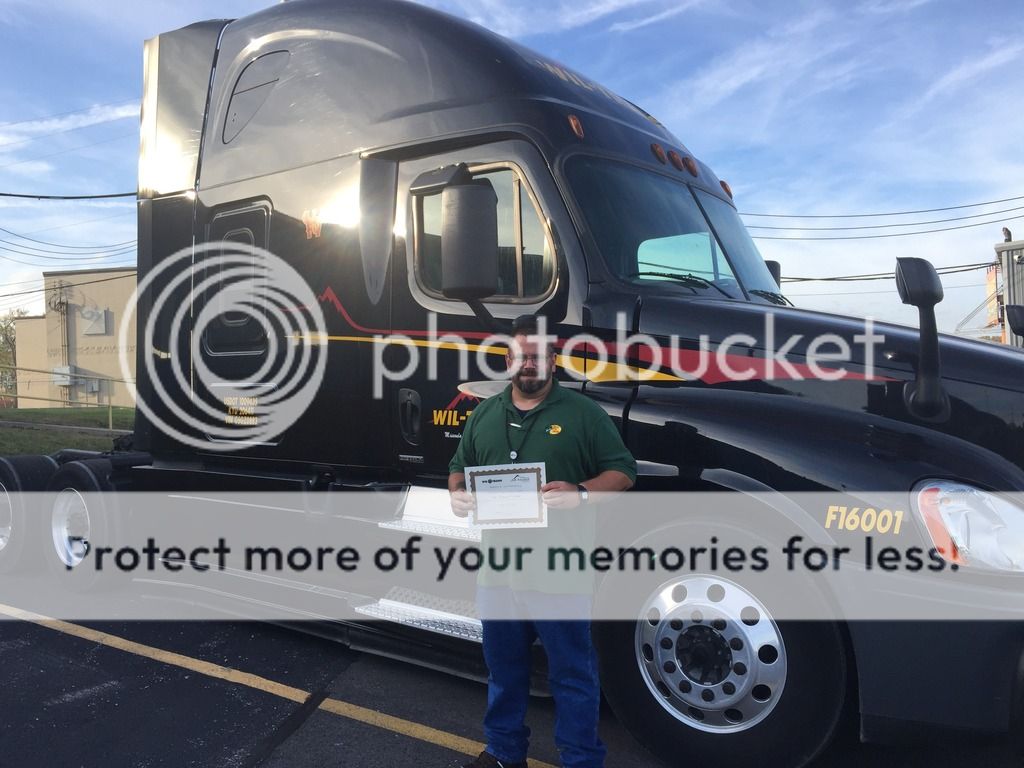Passed CDL Today
Topic 16826 | Page 1

Patience is always your friend, and 61MPH is a wonderfully stress-free speed on the interstates at times.
Interstate:
Commercial trade, business, movement of goods or money, or transportation from one state to another, regulated by the Federal Department Of Transportation (DOT).
WOO HOO!!!! Here you go.......... it's your turn for.......












Dancin' Nanners!!

Congratulations

Butcher,...beyond my congratulatory reply I'll share some thoughts on your questions about tips or advice.
The next phase of your journey is road training, a month or so sharing the closet with a trainer. Like many things in this business, building and managing the relationships of the people we work with and work for is important to success and happiness. Might as well consider your trainer to be the first of many relationships you'll have throughout your career.
If you haven't already done so, establish an understanding with your trainer; review their expectations and the limitations they will require of you. Things like sharing space, showers, laundry, and eating are things you should try to get a clear understanding of up front, before you hit the road. I would also suggest and review how your trainer intends to help and instruct you on training topics; driving under a load, winter driving techniques, mountain driving, real life backing scenarios, trip-planning, HOS management, and handling yourself at a shipper/receiver. Initially try your best to establish a base understanding, discuss any issues before they fester into a problem, and apply common sense to your learning process. Do not be timid when it comes to standing up for what you know to be correct and/or unsafe.
With all of that said, your trainer also needs to clearly understand your expectations and where you believe you require extra help. Again, don't be timid in clearly communicating with your trainer what you need and require. Things will not always go as expected,...again try to work it out. If all reasonable efforts to correct or work through a problem fail, make sure you understand your company's protocol for escalating a training issue and take action. Don't wait, for instance if you are a week into training with no shower and/or no backing maneuvers. Be your own advocate, this is your training and will serve as a basis for safe and efficient solo operation.
Beyond that here are some additional basics to consider:
Never, never rush. Take your time. Rookie mistakes many times are a result of rushing, hurrying at the expense of safe operation.
Manage your space, front sides, rear (to the extent that you can), and even above you. Watch for low hanging tree branches or structures. Pay close attention to low overpass warnings.
When in close quarters GOAL as much as you need to. If something is really tight and you can, GOAL before you are actually "in it", proactively figure out and plan your set-up approach. Take note of any obstructions that will be difficult to see from your vantage point in the cab.
Always watch your wagon,...use all of your mirrors. Drive the trailer.
Do not rely entirely on the Qualcomm or other GPS device. Review your route a head of time. I use a yellow sticky note for written directions,...I continue this practice religiously. Electronic devices fail, can reboot without warning, and are not 100% reliable. Have a back-up.
Common sense. Use it all the time. If something seems unsafe or wrong to you, it probably is.
Safe travels. Good luck.
Shipper:
The customer who is shipping the freight. This is where the driver will pick up a load and then deliver it to the receiver or consignee.
Qualcomm:
Omnitracs (a.k.a. Qualcomm) is a satellite-based messaging system with built-in GPS capabilities built by Qualcomm. It has a small computer screen and keyboard and is tied into the truck’s computer. It allows trucking companies to track where the driver is at, monitor the truck, and send and receive messages with the driver – similar to email.HOS:
Hours Of Service
HOS refers to the logbook hours of service regulations.
Butcher,...beyond my congratulatory reply I'll share some thoughts on your questions about tips or advice.
The next phase of your journey is road training, a month or so sharing the closet with a trainer. Like many things in this business, building and managing the relationships of the people we work with and work for is important to success and happiness. Might as well consider your trainer to be the first of many relationships you'll have throughout your career.
If you haven't already done so, establish an understanding with your trainer; review their expectations and the limitations they will require of you. Things like sharing space, showers, laundry, and eating are things you should try to get a clear understanding of up front, before you hit the road. I would also suggest and review how your trainer intends to help and instruct you on training topics; driving under a load, winter driving techniques, mountain driving, real life backing scenarios, trip-planning, HOS management, and handling yourself at a shipper/receiver. Initially try your best to establish a base understanding, discuss any issues before they fester into a problem, and apply common sense to your learning process. Do not be timid when it comes to standing up for what you know to be correct and/or unsafe.
With all of that said, your trainer also needs to clearly understand your expectations and where you believe you require extra help. Again, don't be timid in clearly communicating with your trainer what you need and require. Things will not always go as expected,...again try to work it out. If all reasonable efforts to correct or work through a problem fail, make sure you understand your company's protocol for escalating a training issue and take action. Don't wait, for instance if you are a week into training with no shower and/or no backing maneuvers. Be your own advocate, this is your training and will serve as a basis for safe and efficient solo operation.
Beyond that here are some additional basics to consider:
Never, never rush. Take your time. Rookie mistakes many times are a result of rushing, hurrying at the expense of safe operation.
Manage your space, front sides, rear (to the extent that you can), and even above you. Watch for low hanging tree branches or structures. Pay close attention to low overpass warnings.
When in close quarters GOAL as much as you need to. If something is really tight and you can, GOAL before you are actually "in it", proactively figure out and plan your set-up approach. Take note of any obstructions that will be difficult to see from your vantage point in the cab.
Always watch your wagon,...use all of your mirrors. Drive the trailer.
Do not rely entirely on the Qualcomm or other GPS device. Review your route a head of time. I use a yellow sticky note for written directions,...I continue this practice religiously. Electronic devices fail, can reboot without warning, and are not 100% reliable. Have a back-up.
Common sense. Use it all the time. If something seems unsafe or wrong to you, it probably is.
Safe travels. Good luck.
Awesome advice & tips. Thank you very much.
Shipper:
The customer who is shipping the freight. This is where the driver will pick up a load and then deliver it to the receiver or consignee.
Qualcomm:
Omnitracs (a.k.a. Qualcomm) is a satellite-based messaging system with built-in GPS capabilities built by Qualcomm. It has a small computer screen and keyboard and is tied into the truck’s computer. It allows trucking companies to track where the driver is at, monitor the truck, and send and receive messages with the driver – similar to email.HOS:
Hours Of Service
HOS refers to the logbook hours of service regulations.New Reply:
New! Check out our help videos for a better understanding of our forum features

















Preview:









 TT On Facebook
TT On Facebook
Hello all
I passed CDL today. I've read with interest a lot of the older threads re: advice for rookie drivers. I'd be grateful for any and all advice, tips, wisdom and etc.
This website was crucial to me passing both written & all practical tests.
Thank you to all on here who are helping us newbies
CDL:
Commercial Driver's License (CDL)
A CDL is required to drive any of the following vehicles: